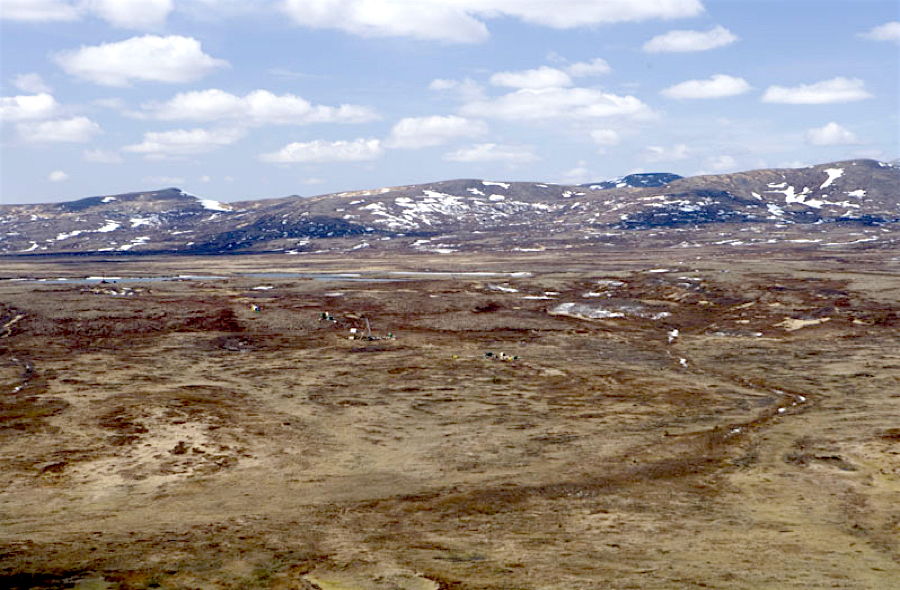
The Environmental Protection Agency is scrapping proposed restrictions on mining operations in Alaska’s Bristol Bay, dealing a victory to Northern Dynasty Minerals Ltd., which is hoping to tap a $100 billion copper-gold deposit in the region.
The move does not guarantee the U.S. government will issue a permit for the company’s planned Pebble Mine. But the decision removes a major barrier to the project, which has been thwarted by Obama-era water pollution limitations proposed in 2014 but never finalized.
For decades, developers have been beckoned by the lode in southwestern Alaska, which boasts vast resources of gold, copper, molybdenum and other minerals
Northern Dynasty was up 6% at 2:14 in New York after jumping as much as 14% on the news. More than 3 million shares had traded hands, almost double the three-month daily average.
The Trump administration said it was withdrawing that proposal Tuesday because the restrictions led to an unfair veto of the mining project based on outdated assumptions about the mine’s design and its risks to the world’s most productive wild salmon fishery.
“In the Trump administration, we’re not for preemptive vetoes of projects,” EPA General Counsel Matthew Leopold said. “We think everyone should have a chance to submit their project and have it evaluated based on the law — not preemptively — and that’s what this is about restoring.”
The U.S. Army Corps of Engineers is expected to decide on whether to authorize the project next year. The EPA’s action Tuesday allows the agency to collaborate with the Corps during the permitting process.
For decades, developers have been beckoned by the lode in southwestern Alaska, which boasts vasts resources of gold, copper, molybdenum and other minerals near the headwaters of two rivers flowing into Bristol Bay. But conservationists, local activists, fishermen and federal regulators have argued that industrial, open-pit mining operations to extract the bounty threatens the region’s flourishing sockeye salmon fishery.
The EPA itself warned of the risks on July 1 and said it was concerned the Army Corps was underestimating “the extent and magnitude of the substantial proposed impacts to streams, wetlands and other aquatic resources.”
The EPA now has nearly three months to decide whether it will enter into negotiations with the Army Corps over the project under an extension granted last week. That formal consultation process — prescribed by a federal clean water law — is meant to allow top officials from both agencies to work out disagreements over a potential mine permit.
Although the high-level negotiations can lead to a rejection of the project, “the more usual case is that it leads to some amendment to the permit or some change in the proposed permit” — not “an all-or-nothing veto,” Leopold said.
Northern Dynasty and Pebble LP have argued that the new mine plan now under Army Corps review is significantly different from what the Obama administration envisioned in 2014, when it used special veto powers under the Clean Water Act to propose restricting the discharge of mining waste and other material in the watershed. The proposed limitations were never legally finalized.
The EPA has taken an inconsistent approach to the project under President Donald Trump
The EPA’s 2014 position was based on hypothetical scenarios and speculative information derived partly from Pebble filings with the Securities and Exchange Commission, Leopold said. Now that there is an actual permit application, “those mining hypotheticals from 2014 are out of date,” and the EPA has an obligation to consider the current information.
Under Pebble’s current, smaller mine proposal, facilities storing mining waste would be lined, cyanide would not be used to extract gold from the site and the company does not plan facilities in Upper Talarik Creek, one of the waterways thought to be affected in 2014.
Environmentalists say those steps don’t go far enough to protect hundreds of acres of lakes, wetlands and other marine areas in the region — nor the salmon, Alaska natives and the multimillion-dollar fishing economy that depend on them.
The United Tribes of Bristol Bay, a consortium of 15 tribal governments, calls the mine “a toxic project” that would unleash “devastating consequences” on Bristol Bay.
The EPA has taken an inconsistent approach to the project under President Donald Trump. While the EPA swiftly proposed discarding the Obama water limits, former EPA Administrator Scott Pruitt made a surprise decision to leave them in place eight months later. Current EPA Administrator Andrew Wheeler has recused himself from any involvement in the issue, because his former law firm Faegre Baker Daniels LLP provided services to Pebble.
(By Jennifer A. Dlouhy)
Comments